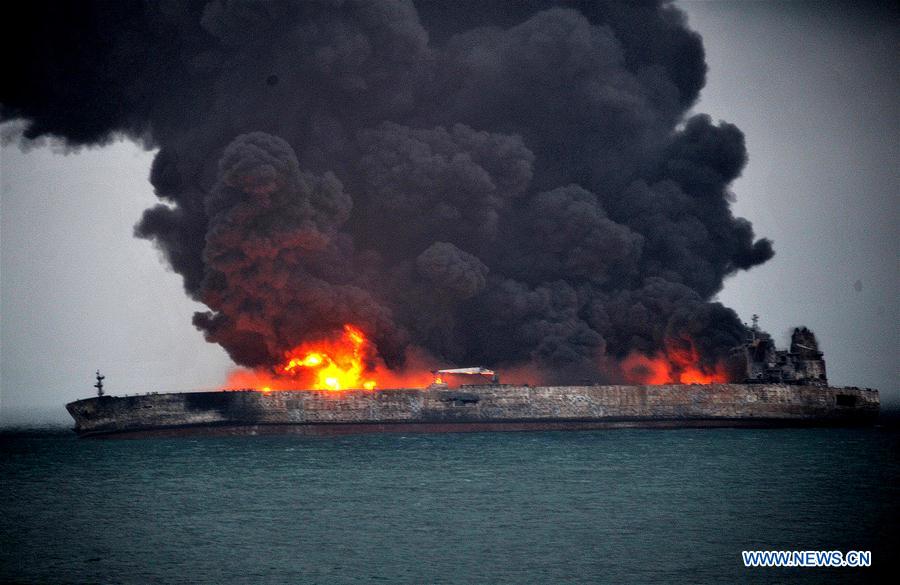


The Panama-registered oil tanker is seen on fire in waters about 160 sea miles east of the Yangtze River's estuary, Jan. 7, 2018. Thirty-two crew members, including 30 Iranians and two Bangladeshis, have gone missing after two vessels collided off China's east coast on Saturday evening, China's Ministry of Transport said Sunday. (Xinhua)
A damaged oil tanker exploded in the East China Sea on Wednesday creating a potential environmental problem for the region.
Search and rescue vessels withdrew to a safe distance after the bow of the Sanchi exploded 13.35 pm on Wednesday, China's Ministry of Transportannounced on Wednesday.
China's largest patrol ship Haixun 01continued to fight the fire after the explosion while organizing other vessels to move away, the ministry said.
According to the ministry, Japanese sea police arrived at the scene an hour before the explosion and built a connection with Haixun 01, the control vessel of the Chinese search and rescue vessels.
The explosion could be a disaster for the Zhejiang Province city of Zhoushan as the location of China's most important fish farm, Lin Boqiang, director of the China Center for Energy Economics Research at Xiamen University, told the Global Times.
"For now, burning might be good for consuming the leaked oil, but there will be some remaining for which disposal will be difficult," Lin said.
Sanchi was carrying 136,000 tons of condensate oil 8 pm on Saturday when it became involved in a collision with CF Crystal, a Hong Kong-registered bulk freighter in waters about 160 nautical miles east of the Yangtze River estuary, the Xinhua News Agency reported Wednesday.
A body salvaged from nearby waters on Monday is believed to be one of 32 crew members still missing from the Panama-registered tanker that belongs to an Iranian shipping company.
The 21 crew members aboard the CF Crystal- all Chinese nationals - were rescued, the ministry said.
CF Crystalwas confirmed to have arrived at the Laotangshan port in Zhoushan on Wednesday noon, the transport ministry said.
Condensate oil is highly flammable and explosive, said Gong Yongjun, a professor at the Transportation Equipment and Marine Engineering College of Dalian Maritime University.
But the oil is usually not degradable, meaning the damage to the ocean would be long-term, he said. Recycling and cleaning the oil was essential, Gong noted.
Zhao Ruxiang, an expert with China's Yantai Oil Spill Response Technical Center, was quoted by the ministry as saying that a simulation test showed condensate oil in the water can evaporate so quickly that it will leave little residue - less than 1 percent after five hours, Xinhua reported.
It is toxic and volatile when exposed to air, Zhao said.
An employee in charge of publicity at Sinopec Zhenhai Refining & Chemical Company in Ningbo, Zhejiang Province told the Global Times on Wednesday that the company had not received any notice from upper departments requesting the company react to the event.
In dealing with any leaked oil, China has the technology to curb the pollution and mitigate the environmental damage caused by the accident, Lin said.

 Award-winning photos show poverty reduction achievements in NE China's Jilin province
Award-winning photos show poverty reduction achievements in NE China's Jilin province People dance to greet advent of New Year in Ameiqituo Town, Guizhou
People dance to greet advent of New Year in Ameiqituo Town, Guizhou Fire brigade in Shanghai holds group wedding
Fire brigade in Shanghai holds group wedding Tourists enjoy ice sculptures in Datan Town, north China
Tourists enjoy ice sculptures in Datan Town, north China Sunset scenery of Dayan Pagoda in Xi'an
Sunset scenery of Dayan Pagoda in Xi'an Tourists have fun at scenic spot in Nanlong Town, NW China
Tourists have fun at scenic spot in Nanlong Town, NW China Harbin attracts tourists by making best use of ice in winter
Harbin attracts tourists by making best use of ice in winter In pics: FIS Alpine Ski Women's World Cup Slalom
In pics: FIS Alpine Ski Women's World Cup Slalom Black-necked cranes rest at reservoir in Lhunzhub County, Lhasa
Black-necked cranes rest at reservoir in Lhunzhub County, Lhasa China's FAST telescope will be available to foreign scientists in April
China's FAST telescope will be available to foreign scientists in April